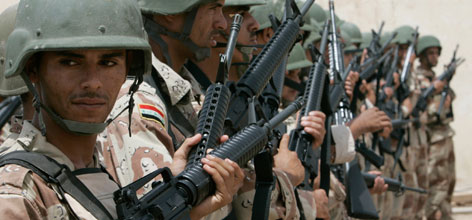Iraq military advances towards rebel-held Tikrit

Iraqi forces have launched an operation to retake Tikrit, the hometown of toppled President Saddam Hussein, from Islamic State fighters.
Al Jazeera sources reported that the troops were advancing from the south and southwest and heavy clashes with the armed group were taking place 10km from the the city, capital of Salahidin province and located about 200km north of Baghdad.
Tikrit fell to the group formerly known as ISIL on June 11 and has since been controlled mostly by Sunni armed groups, including former members of Saddam’s ruling Baath party.
“We have to remember Tikrit is an urban city so there’s going to be fighting in urban areas. The army had abandoned their positions in much of the Sunni heartland in June when the IS group took control of that territory,” Al Jazeera’s Zeina Khodr reported from Erbil.
“There’s a real risk of this becoming a Sunni-Shia war because the Iraqi army now is dominated by Shia’s and they’re getting the support of Shia militias,” she added.
The troops’ advance from the south was slowed down by landmines, roadside bombs and snipers installed by Islamic State fighters, an army major and a police captain said.
The offensive in Tikrit came a day after Kurdish Peshmerga forces regained control over the strategic Mosul dam from Islamic State fighters after days of fighting, aided by dozens of air strikes from US jets and drones in the north.
Islamic State fighters have seized Iraq’s second city, Mosul, and control large swaths of land in northern Iraq and in Neighbouring Syria.
Also yesterday, the UN refugee agency announced that it was launching a major aid operation to get supplies to more than half a million people displaced by fighting in northern Iraq.
A four-day airlift of tents and other goods will begin today to Erbil from Aqaba in Jordan, followed by road convoys from Turkey and Jordan and sea shipments from Dubai via Iran over the next 10 days, UNHCR spokesman Adrian Edwards said.
“This is a very, very significant aid push and certainly one of the largest I can recall in quite a while,” Edwards said in Geneva.
“This is a major humanitarian crisis and disaster. It continues to affect many people.” — AFP










Comments